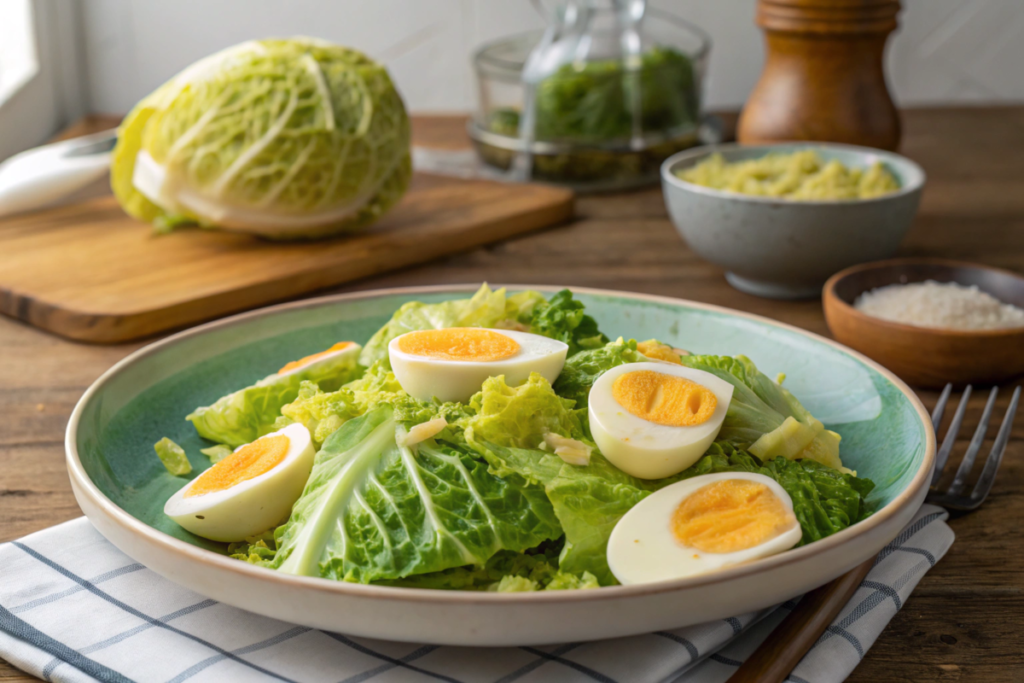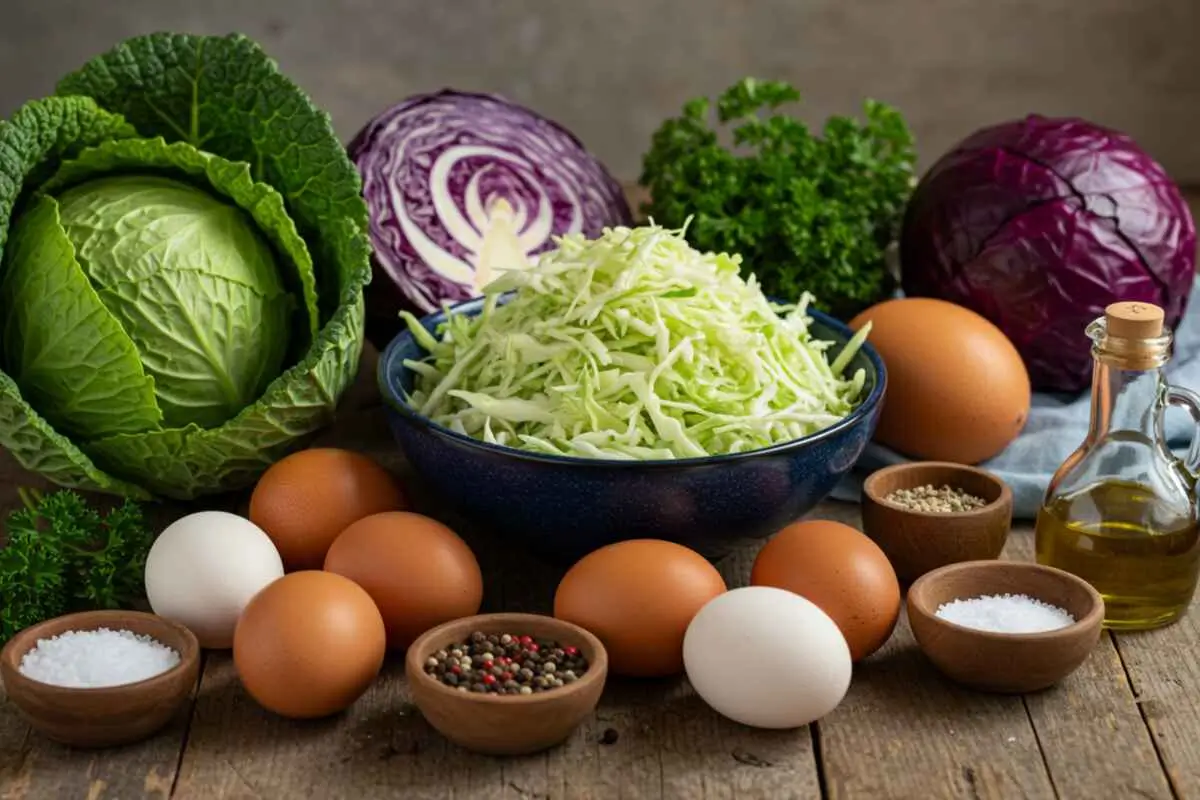Introduction
and eggs are two of the most flexible and healthy foods you’ll find in kitchens worldwide. Even though they may seem like simple items, their shared nutrition and cooking potential make them a key part of many cuisines. You can use them for hearty breakfasts, light lunches, or filling dinners. No matter the occasion, cabbage and eggs can turn into a range of tasty dishes.
It’s no surprise they are so popular. Cabbage is full of vitamins, fiber, and antioxidants, while eggs are packed with protein and other important nutrients. Together, they please a variety of tastes and bring many health benefits. Whether you’re making a quick stir-fry or trying a new recipe, cabbage and eggs can take your meals to the next level.
In this article, you’ll learn about their nutrition, health perks, and all the ways they can be used. You’ll also find tips for cooking, storing, and even exciting recipes to make at home!
Nutritional Profile
To appreciate the true value of cabbage and eggs, let’s take a closer look at their nutritional content.
Nutritional Value of Cabbage
Cabbage is a cruciferous vegetable renowned for its low-calorie, high-fiber content. Here’s what a single cup (89g) of chopped cabbage offers:

- Calories: 22
- Carbohydrates: 5g
- Fiber: 2g
- Vitamin C: 54% of the recommended daily intake (RDI)
- Vitamin K: 85% of RDI
- Folate: 10% of RDI
Cabbage is also packed with antioxidants like polyphenols and sulfur compounds, which contribute to its anti-inflammatory properties.
Nutritional Value of Eggs
Eggs are nature’s protein powerhouse. A single large egg provides:
- Calories: 70
- Protein: 6g
- Fat: 5g (mostly healthy unsaturated fats)
- Vitamin D: 10% of RDI
- Vitamin B12: 9% of RDI
- Selenium: 22% of RDI
Eggs also contain lutein and zeaxanthin, antioxidants that support eye health.
Combined Nutritional Benefits
When paired, cabbage and eggs create a balanced meal that’s high in protein, low in carbs, and packed with essential vitamins. This combination makes them ideal for individuals looking to boost energy, improve digestion, and support overall health.
Health Benefits of Cabbage
Cabbage isn’t just a crisp, tasty part of meals—it’s also packed with good stuff that can help your body in many ways.
Helps Your Digestion
Cabbage is full of fiber, which helps your stomach work better and keeps your bowel movements regular. It also feeds the good bacteria in your gut, keeping your digestive system healthy.
Good for Your Heart
Red cabbage has natural colors called anthocyanins and also contains potassium. These can help lower blood pressure and support a strong heart.
Full of Antioxidants
Cabbage has lots of antioxidants like vitamin C and other natural compounds that fight damage from harmful molecules, which may help lower the risk of serious diseases like cancer.
Fights Inflammation
Cabbage has sulfur-based substances that may reduce swelling in the body. This can be helpful for people with joint pain or arthritis.
Health Benefits of Eggs
Eggs are a common food for a reason. They’re easy to cook and loaded with health perks.
Great Source of Protein
Eggs have all the building blocks your body needs to make muscle and stay strong. This makes them a complete protein.
Boosts Brain Power
Eggs have choline, a nutrient that helps your brain grow, keeps your memory sharp, and can improve your mood.
Helps With Weight Control
Eggs make you feel full for longer. This can help you eat less and manage your weight better.
Protects Your Eyes
Eggs have lutein and zeaxanthin—nutrients that keep your eyes healthy and guard them from damage as you age.
The Combination of Cabbage and Eggs
When combined, cabbage and eggs bring out the best in each other. Here’s why this pairing is so powerful:
Nutritional Synergy
The fiber in cabbage complements the protein in eggs, creating a meal that’s filling and balanced. This combination is excellent for maintaining steady energy levels throughout the day.
Culinary Compatibility
Cabbage and eggs blend effortlessly in terms of flavor and texture. The natural sweetness of cabbage pairs well with the richness of eggs, making dishes like stir-fries, omelets, and wraps irresistible.
Affordable and Accessible
Both cabbage and eggs are widely available and budget-friendly, making them accessible to people from all walks of life.
Popular Dishes with Cabbage and Eggs
Cabbage and eggs are culinary chameleons, lending themselves to numerous dishes from around the globe.
Asian-Inspired Stir-Fry
A quick stir-fry of shredded cabbage, scrambled eggs, soy sauce, and sesame oil creates a savory dish that’s perfect for lunch or dinner.
Egg and Cabbage Pancakes
A popular breakfast option, these pancakes combine shredded cabbage, eggs, and a bit of flour or almond meal for a nutritious twist.
Cabbage and Egg Wraps
Cabbage leaves can serve as a low-carb alternative to tortillas. Fill them with scrambled eggs and vegetables for a satisfying wrap.
Cabbage Omelet
Add sautéed cabbage to your omelet for a crunchy and flavorful variation on the classic dish.
European Slaw and Eggs
Pair a tangy cabbage slaw with poached eggs for a light yet filling meal.
Cooking Tips and Techniques
Proper preparation of cabbage and eggs ensures you retain their flavors and nutrients while creating delectable meals. Here are some practical tips and techniques:
Preparing Cabbage
- Washing: Before using, rinse cabbage thoroughly under cold water to remove dirt and potential pesticide residue.
- Shredding: Use a sharp knife or mandoline slicer for even shreds, especially for stir-fries or slaws.
- Cooking Methods: Cabbage can be sautéed, steamed, stir-fried, or roasted. Avoid overcooking to preserve its crunch and nutrients.
- Seasoning Tips: Complement cabbage with spices like garlic, cumin, or paprika for enhanced flavor.
Cooking Eggs
- Boiling: For perfectly boiled eggs, start with cold water, bring to a boil, and then simmer for 6–8 minutes depending on your preference.
- Scrambling: Whisk eggs thoroughly with a bit of milk or cream for fluffier results.
- Frying: Use nonstick pans with minimal oil for evenly cooked sunny-side-up or over-easy eggs.
- Poaching: Add a splash of vinegar to simmering water to keep egg whites intact while poaching.

Combining Cabbage and Eggs
- Timing: Cook cabbage slightly longer than eggs when combining them in dishes to maintain their respective textures.
- Layering: For recipes like casseroles, layer sautéed cabbage at the bottom to absorb flavors from the eggs.
Cabbage and Eggs for Weight Loss
Cabbage and eggs are excellent options for those aiming to lose weight. Their nutritional composition supports calorie control while providing essential nutrients.
Low-Calorie Density
Cabbage is primarily water and fiber, making it a low-calorie food that promotes satiety. A large serving adds bulk to meals without adding excessive calories.
High-Protein Content
Eggs, on the other hand, are protein-rich and help regulate hunger hormones like ghrelin. Incorporating eggs into meals keeps you feeling fuller for longer.
Balanced Macronutrients
Together, cabbage and eggs form a meal that balances protein, fiber, and healthy fats. This reduces cravings and helps maintain energy levels.
Ideal for Meal Prepping
Prepare dishes like cabbage and egg stir-fries or omelets in advance for quick, healthy meals during the week.
Versatility in Diets
One of the biggest advantages of cabbage and eggs is their ability to fit seamlessly into various dietary preferences and restrictions.
Keto Diet
Cabbage and eggs are both low in carbohydrates, making them ideal for keto-friendly meals. Try cabbage fried in butter with scrambled eggs for a hearty dish.
Vegetarian Diet
While eggs provide a source of animal protein, vegetarians can enjoy this duo by pairing it with plant-based ingredients like tofu or legumes.
Gluten-Free Diet
Naturally gluten-free, cabbage and eggs can replace traditional carbohydrate-heavy ingredients like pasta or bread in meals.
Low-FODMAP Diet
Cabbage and eggs are suitable for individuals managing digestive disorders when used in moderate amounts.
Storing and Preserving
Proper storage of cabbage and eggs ensures they remain fresh and safe to consume.
Storing Cabbage
- Refrigeration: Store cabbage in the crisper drawer, wrapped in plastic or placed in a perforated bag to retain moisture.
- Shelf Life: Fresh cabbage can last 2–3 weeks when stored properly.
- Freezing: Blanch cabbage before freezing to preserve its color and texture.
Storing Eggs
- Refrigeration: Keep eggs in their original carton to protect them from absorbing strong odors in the fridge.
- Shelf Life: Fresh eggs typically last 3–5 weeks in the refrigerator.
- Testing Freshness: Submerge an egg in water; fresh eggs sink, while older ones float.
Potential Downsides
While cabbage and eggs are nutritious, they may pose certain risks if consumed improperly or in excess.
Allergies
Eggs are a common allergen, especially in children. Symptoms include hives, difficulty breathing, and stomach upset. Consult a doctor if you suspect an allergy.
Gas and Bloating
Cabbage contains raffinose, a sugar that can cause gas and bloating in some individuals. Cooking cabbage thoroughly can reduce these effects.
Cholesterol Concerns
Although eggs contain dietary cholesterol, research shows they don’t significantly impact blood cholesterol levels in most people. However, those with existing heart conditions should consult their doctor.
Environmental and Sustainability Factors
The environmental impact of cabbage and eggs varies, but both can be produced sustainably.
Sustainable Farming
- Cabbage: Often grown locally with minimal resources, cabbage has a relatively low environmental footprint.
- Eggs: Choose eggs labeled as cage-free, organic, or pasture-raised for more sustainable options.
Reducing Waste
- Use cabbage cores and outer leaves in broths to minimize food waste.
- Save eggshells for composting or as a natural garden fertilizer.
Fun Facts and Trivia
- Cabbage in History: The Ancient Greeks believed cabbage was a gift from the gods and used it medicinally.
- Eggs Around the World: In China, tea eggs are a popular snack infused with savory flavors.
- Cabbage and Eggs in Art: Van Gogh’s paintings featured cabbages as symbols of abundance and simplicity.
Recipes to Try
Cabbage and Egg Stir-Fry

Ingredients:
- 2 cups shredded cabbage
- 2 large eggs
- 1 tbsp soy sauce
- 1 tsp sesame oil
- Optional: garlic, ginger, or chili flakes
Instructions:
- Heat sesame oil in a pan, add garlic and ginger.
- Stir-fry cabbage for 5 minutes.
- Push cabbage to one side, scramble eggs on the other.
- Combine, add soy sauce, and serve hot.
Cabbage and Egg Breakfast Wrap
Ingredients:
- 4 large cabbage leaves
- 2 scrambled eggs
- 1/2 avocado, sliced
- Salt and pepper to taste
Instructions:
- Steam cabbage leaves for flexibility.
- Fill each leaf with scrambled eggs and avocado.
- Roll into wraps and enjoy.
Spiced Egg and Cabbage Bake
Ingredients:
- 3 cups shredded cabbage
- 4 eggs
- 1/2 cup grated cheese
- Spices: paprika, black pepper, and salt
Instructions:
- Preheat oven to 375°F (190°C).
- Layer cabbage in a baking dish, crack eggs on top.
- Sprinkle spices and cheese, bake for 20 minutes.
FAQs
Is cabbage good for breakfast?
Yes, cabbage is an excellent choice for breakfast! Its fiber content promotes digestion and keeps you feeling full throughout the morning. Pairing it with eggs creates a balanced meal rich in protein, making it ideal for a healthy start to the day.
What are three ways you can eat cabbage?
Cabbage is incredibly versatile. Here are three popular ways to enjoy it:
- Raw: In salads or coleslaw, cabbage adds a crunchy texture and refreshing taste.
- Cooked: Stir-fried or steamed cabbage pairs well with various proteins.
- Fermented: Sauerkraut and kimchi are delicious fermented forms of cabbage that boost gut health.
What goes well with eggs for dinner?
Eggs pair wonderfully with many ingredients for a satisfying dinner. Some great options include:
- Cabbage: Sautéed or stir-fried cabbage complements the richness of eggs.
- Spinach and Mushrooms: These create a nutrient-dense omelet or frittata.
- Whole Grain Toast or Quinoa: For a balanced meal with added carbohydrates.
How to color eggs with cabbage?
Cabbage can be used as a natural dye to color eggs, creating beautiful blue hues. Here’s how:
- Boil red cabbage leaves in water for 30 minutes.
- Strain the liquid and add a tablespoon of vinegar.
- Submerge boiled eggs in the mixture and let them sit until they achieve the desired color, usually several hours.
Conclusion
Cabbage and eggs are a dynamic duo that combine affordability, nutritional benefits, and culinary versatility. Whether you’re looking for a quick breakfast, a nutritious meal for weight loss, or a creative recipe to impress guests, these two ingredients deliver on all fronts.
By incorporating cabbage and eggs into your diet, you can enjoy a balanced and healthy lifestyle without compromising on taste or convenience. From their rich history to their environmental benefits, they prove to be much more than just kitchen staples.
So, why not try one of the recipes shared above? Discover for yourself how cabbage and eggs can transform your meals into something extraordinary.

